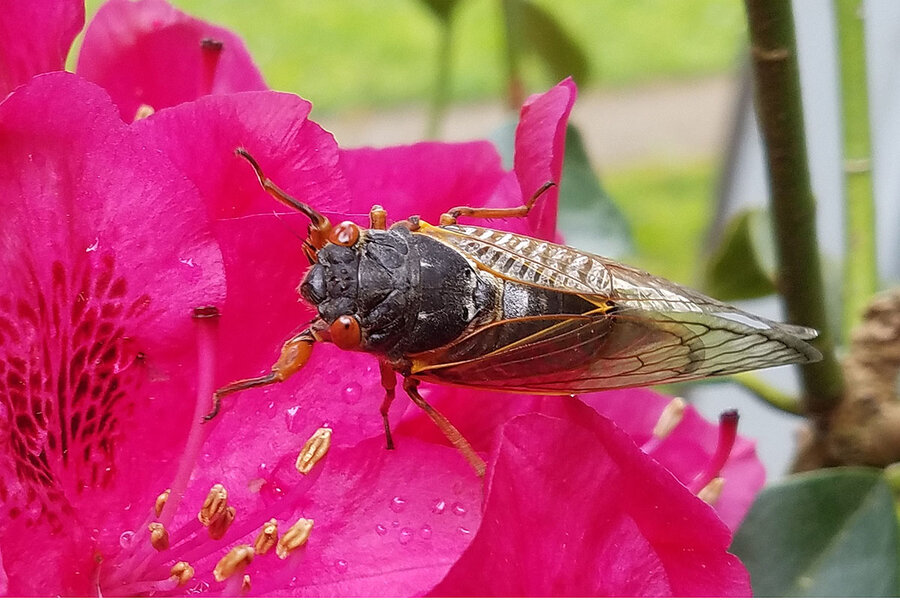
A cicada sits on a flower in Union County, Georgia, during the Brood X emergence in May 2021.
The late spring is always a trying time to be a substitute teacher, with students quickly losing interest as the summer approaches. This pandemic year has been hard on everyone, from wearing masks and hybrid schedules featuring double periods to in-person learning only four days a week. Nice weather means students can take mask breaks outside, but now there is another complication — cicadas. Each day brings a lecture about not bothering these strange insects nor bringing them into the classrooms. This is just a natural phenomenon and not simply another way to terrorize girls. It has me wondering, is there anything positive about this?
According to the article “Bug-eyed About Invading Cicadas? They Might Teach You Some Life Lessons” by the Christian Science Monitor’s Dwight Weingarten (https://www.csmonitor.com/Environment/2021/0504/Bug-eyed-about-invading-cicadas-They-might-teach-you-some-life-lessons ), we can learn quite a bit from this infestation.
First, we’re all in this world together. Fortunately, humans don’t have to spend 17 years under the soil, preparing for frantic three or so weeks above the ground. But these insects do have their place in the Circle of Life. They don’t feast on our gardens or deliberately try to interfere with our lives, they just do their thing to make way the next generation.
And while living beneath the surface may seem like a waste, they are performing an important function by aerating the soil. In other words, they’re busy doing good work even though no one is watching.
How many times have you told your kids to ditch their computers and get outside? That’s exactly what the cicadas are doing — when the weather gets nice and warm, 64 degrees Fahrenheit, is when they appear. After over a year of COVID restrictions, that’s a good lesson for us all.
When the time is right, they don’t mess around. They all rise at once and do what they have to do — produce the next generation. By working together, they successfully overwhelm their predators and ensure their success. Think how much we could accomplish if we all rose up together!
Once they’re safely out, they quickly molt, leaving their shells so they can fly. “It’s just their outer shell that they’ve outgrown,” explains DeAnna Beasley, an assistant professor and integrative ecologist at the University of Tennessee-Chattanooga. In other words, they can’t soar until they come out of their shells.
Granted, cicadas are noisy. But all that noise has a purpose. They can only be heard when they are above ground, and only to ensure their species survives. This is quite a contrast to our species, when many of us seem to sound off for no apparent purpose. By the way, for more on this noise, see “Secrets of the Cicada’s Sound” (https://www.sciencedaily.com/releases/2013/05/130530152846.htm).
So rather than begrudge their moment in the sun, perhaps we can learn from them. Maybe we would be better off if we acted more like cicadas?
